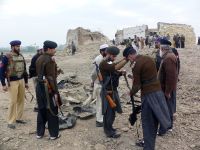Palestinian President Yasser Arafat and other Arab leaders arrived here Friday for an emergency Arab summit aimed at supporting the Palestinians in their bloody clashes with Israel while keeping the peace process alive.
Arafat said he had come to Cairo to discuss the fate of a three-day-old truce announced in the Egyptian resort of Sharm el-Sheikh, now in jeopardy with nine Palestinians killed in fresh violence on the West Bank.
Arab foreign ministers have adopted a document to be given Saturday and Sunday to Arab heads of state detailing limited "measures" against Israel but reaffirming peace as "a strategic choice," delegates said.
Diplomats said the document calls on Arab countries that have relations with Israel, but not a peace treaty, to "stop all relations and all cooperation" with the Jewish state.
Those countries are Qatar, Oman, Tunisia, Morocco and Mauritania, which would have to close or freeze activities at the trade or interests missions they have exchanged with Israel, they said.
Egypt and Jordan, which signed peace treaties with Israel in 1979 and 1994, and the Palestinian Authority, which signed the Oslo accords in 1993, would not have to abide by the measure.
The document also calls for some Israelis to be prosecuted in an international court for "war crimes."
The hard-hitting document condemns Israel for "violating the principles of the peace process," for causing "a setback in the peace process," and for "plunging the region back into a spiral of violence."
At the same time, it sends a message to the world that the Arabs hope for the peace process to continue.
But Israel threatened Friday to rethink the whole Middle East peace process and take a "time out" if the Arab summit took a radical line.
The summit proposals also stress "Arab and Islamic sovereignty" over east Jerusalem, adding that the sector should be the capital of a Palestinian state.
The current wave of violence erupted September 28 when Israel's hawkish opposition leader Ariel Sharon visited a shrine holy to Muslims and Jews in east Jerusalem, a move Palestinians saw as trying to impose Israeli sovereignty over the area.
The document also backs Palestinian calls for an international commission of inquiry into the causes of the violence, which would be submitted to the United Nations.
Arafat failed to win support for such a commission during the Sharm el-Sheikh summit with US President Bill Clinton that wound up Tuesday. He came away only with a US-led fact-finding committee.
The summit is also to decide on creating a fund supporting the Palestinians, with donations from Arab countries.
Syria, whose peace talks with Israel are suspended, has taken a harder line, calling instead for a complete end to Arab-Israeli links and even a ban on handshakes between Israeli and Arab officials.
But Egypt's President Hosni Mubarak warned the summit would only succeed if it focused on "reasonable" measures against Israel.
The meeting "will succeed if it responds to reasonable demands of the Arab peoples, and not to overexcitement. It will run aground if it exceeds the normal range of interests of Arab citizens," he said in a newspaper interview.
The foreign ministers have also decided to limit the agenda of the Cairo meeting to the Palestinian position and whether to hold annual summits in March, rather than divisive issues such as the decade-old UN embargo on Iraq.
Other questions are to be addressed at the next ordinary Arab summit, which would take place in March 2001 under King Abdullah II of Jordan, but at the seat of the Arab League in Cairo -- CAIRO (AFP)
© 2000 Al Bawaba (www.albawaba.com)







